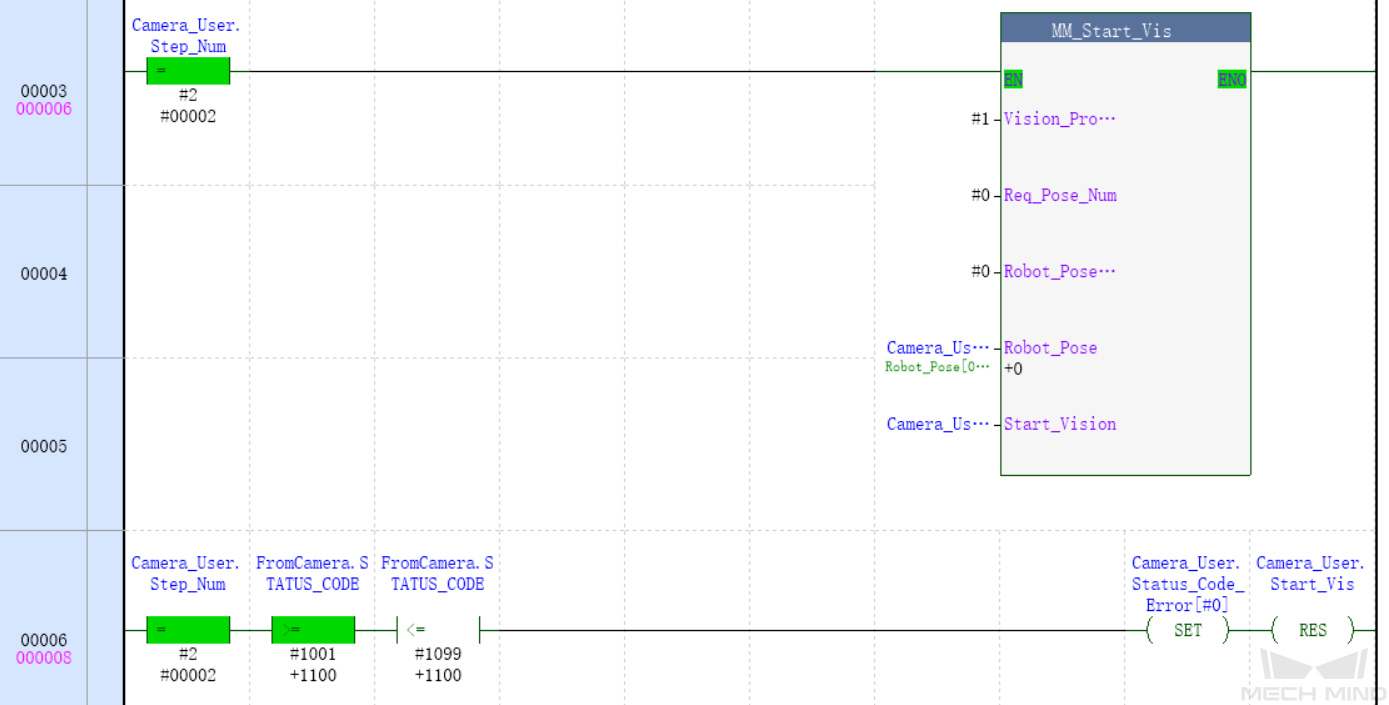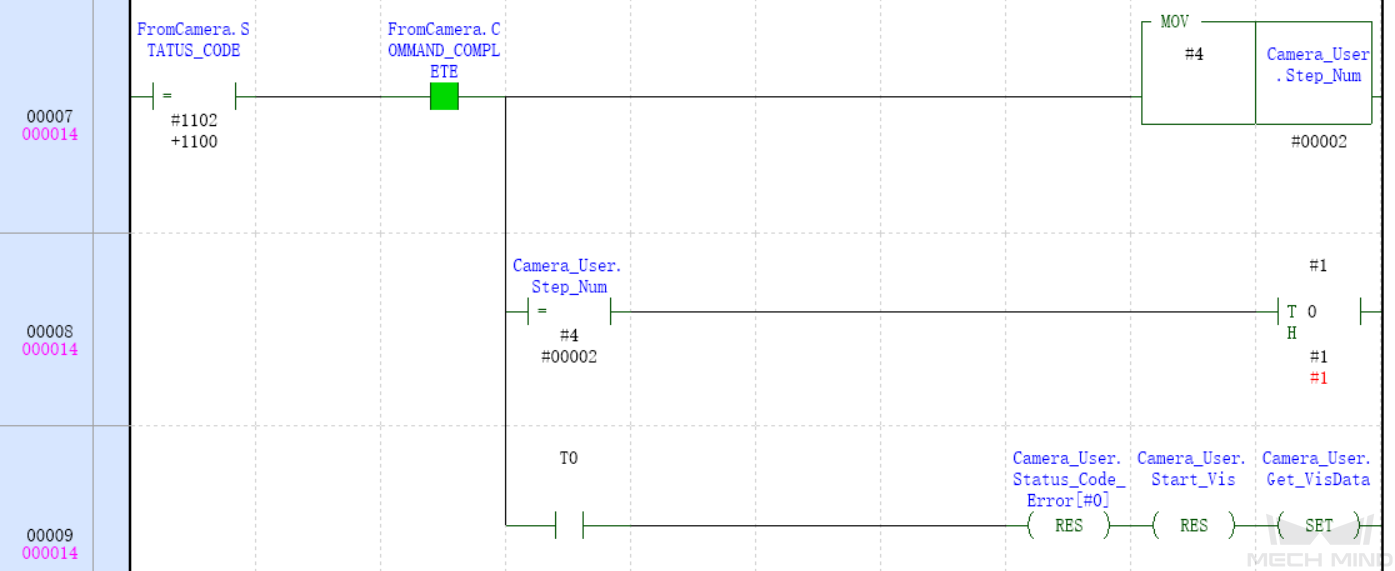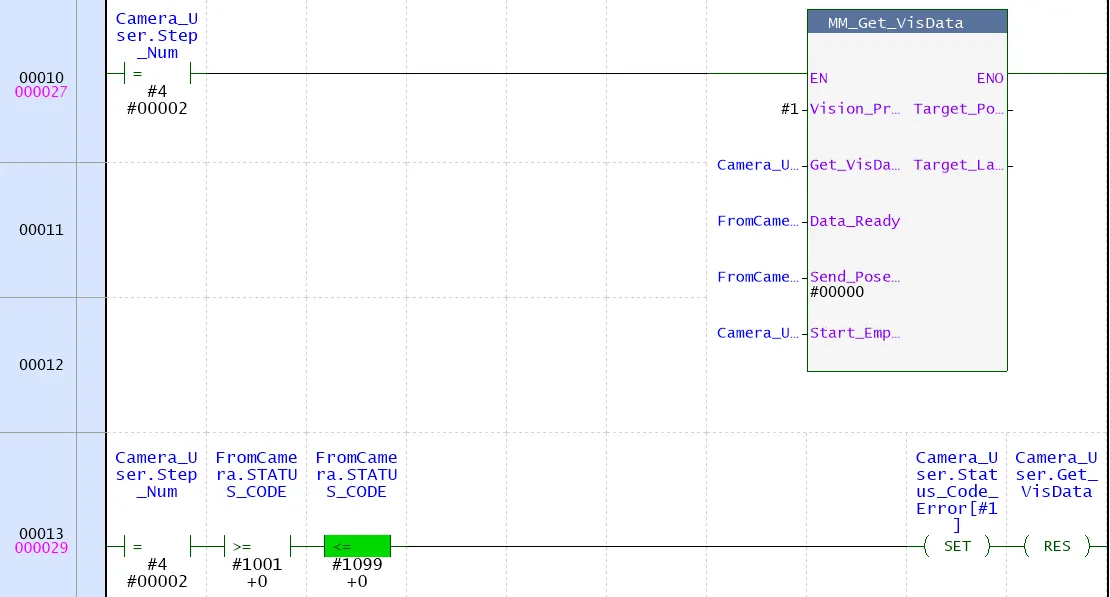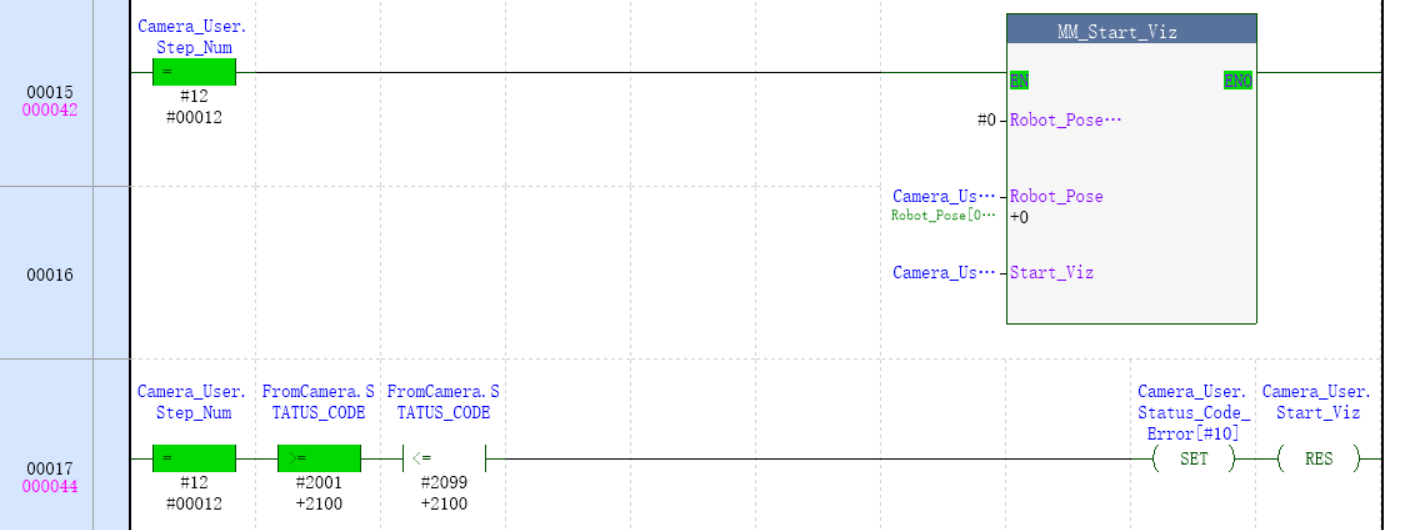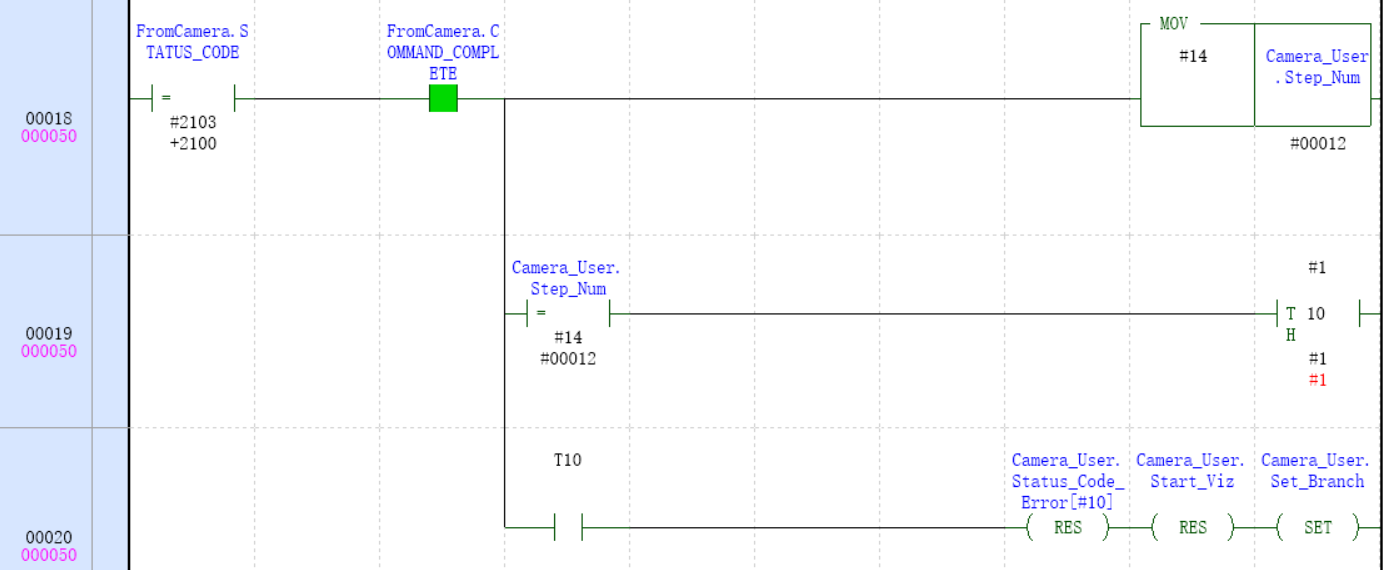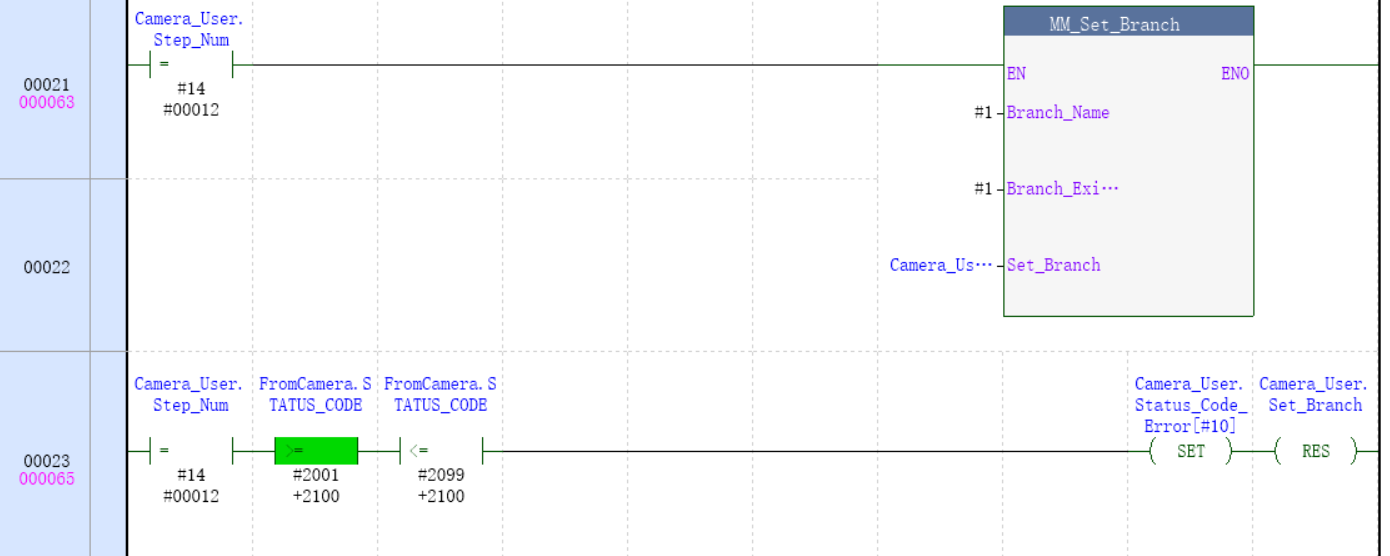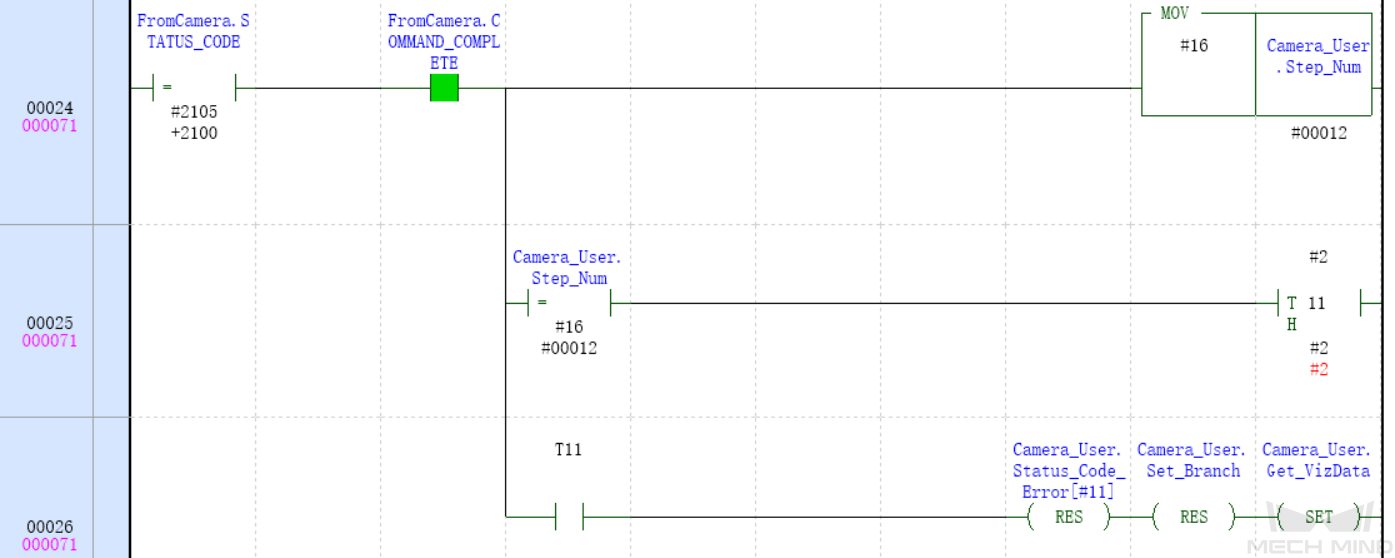Communication Configuration and Example Program Usage
This topic provides two methods on setting up the Standard Interface communication based on the EtherNet/IP protocol between a KEYENCE PLC and Mech-Mind Vision System.
-
Use PCI-e card.
-
Configure the software. No card required.
|
Hardware and Software Requirements
|
The models and versions listed below are tested and can be used. For other models and versions, you may refer to this guide for operation. If any issues occur, please contact Mech-Mind Technical Support. |
Hardware
If you configure the software to set up the EtherNet/IP communication, click this line to view the required hardware and hardware connection settings.
-
KEYENCE PLC: KV-8000 series, or other models with a KV-EP21V or KV-NC1EP EtherNet/IP Unit
A KV-8000 model is used in the example below. -
USB Type A Male to Type B Male cable
-
AC 220V to DC 24V power adapter
-
Network switch and Ethernet cables
-
IPC
The hardware connection is as follows. Each device has a unique IP address, but all must be in the same subnet and not in use by other devices. For the IP address settings of the PLC, refer to the section below. For the IP address settings of the IPC and the computer with KV STUDIO installed, see this link.
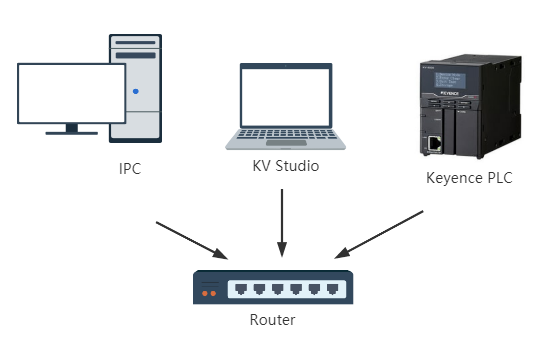
If you use a PCI-e card to set up the EtherNet/IP communication, click this line to view the required hardware and hardware connection settings.
-
KEYENCE PLC: KV-8000 series, or other models with a KV-EP21V or KV-NC1EP EtherNet/IP Unit
A KV-8000 model is used in the example below. -
USB Type A Male to Type B Male cable
-
AC 220V to DC 24V power adapter
-
Network switch and Ethernet cables
-
HMS IXXAT INpact EIP Slave PCIe interface card installed on the IPC or host computer
The hardware connection is as follows. Each device has a unique IP address, but all must be in the same subnet and not in use by other devices. For the IP address settings of the PLC and communication card, refer to the section below. For the IP address settings of the IPC and the computer with KV STUDIO installed, see this link.

Software
If you configure the software to set up the EtherNet/IP communication, click this line to view the required software.
| Software | Description | Installed Location |
|---|---|---|
KV STUDIO 11.41 |
KEYENCE PLC programming software |
Computer that is used for KEYENCE PLC programming |
Mech-Vision & Mech-Viz versions: 2.0.0 or above |
Software that provides the Mech-Mind Vision System |
IPC |
Please copy and paste the following files from the IPC to a PC with KV STUDIO installed for subsequent use.
-
Software EIP.eds file, which is used to provide the identity information of the IPC in the EtherNet/IP network.
The Software EIP.eds file can be found in the
Communication Component/Robot_Interface/EthernetIP/EDSpath in the directory where Mech-Vision and Mech-Viz are installed. -
PLC example program files:
-
CameraSignalsMove.mod (used to send signals of the vision system)
-
CameraTest.mod (used for testing of the vision system)
-
MM_XXX_XXX.kfb (used to implement the features of various interface commands)
The files are stored in
Communication Component/Robot_Interface/EthernetIP/Programming Samples/Keyence KV-8000 PLC EthernetIPin the installation directory where Mech-Vision & Mech-Viz are installed.
-
If you use a PCI-e card to set up the EtherNet/IP communication, click this line to view the required software.
| Software | Description | Installed Location |
|---|---|---|
KV STUDIO 11.41 |
KEYENCE PLC programming software |
Computer that is used for KEYENCE PLC programming |
Communication card driver software |
IPC |
|
Mech-Vision & Mech-Viz versions: 2.0.0 or above |
Software that provides the Mech-Mind Vision System |
IPC |
Used for setting up the IP address of the PCIe card |
IPC |
Please copy and paste the following files from the IPC to a PC with KV STUDIO installed for subsequent use.
-
005A002B003A0100.EDS file, which is used to provide the identity information of the IPC in the EtherNet/IP network.
The 005A002B003A0100.EDS file can be found in the
Communication Component/Robot_Interface/EthernetIP/EDSpath in the directory where Mech-Vision and Mech-Viz are installed. -
PLC example program files:
-
CameraSignalsMove.mod (used to send signals of the vision system)
-
CameraTest.mod (used for testing of the vision system)
-
MM_XXX_XXX.kfb (used to implement the features of various interface commands)
The files are stored in
Communication Component/Robot_Interface/EthernetIP/Programming Samples/Keyence KV-8000 PLC EthernetIPin the installation directory where Mech-Vision & Mech-Viz are installed. -
Configure Communication
If you configure the software to set up the EtherNet/IP communication, click this line to view the detailed operations.
-
Open Mech-Vision, and you may enter different interfaces. Create a new solution according to the instructions below.
-
If you have entered the Welcome interface, click New blank solution.

-
If you have entered the main interface, click on the menu bar.
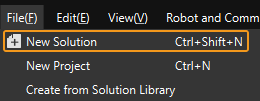
-
Click the Select robot dropdown, and choose either Listed robot or Custom robot according to the robot used in your project. Then click Next.
-
Listed robot: Suitable for most robots. Click Select robot model to choose the specific robot model.
-
Custom robot: Suitable for gantry robots or robots not included in the listed robot category. Robot Euler angle convention and robot coordinate system need to be selected.
-
-
-
In the Robot Communication Configuration window, complete the following configurations.
-
Click the Select robot drop-down menu, and select Listed robot. Click Select robot model, and select the robot model that you use. Then, click Next.
-
In the Communication mode section, set Interface service type to Standard Interface, set Protocol to ETHERNET IP (Software), and set Network Adapters and IP Address to the network adapter and IP address used by the IPC.
-
(Optional) Select Auto enable interface service when opening the solution.
-
Click Apply.
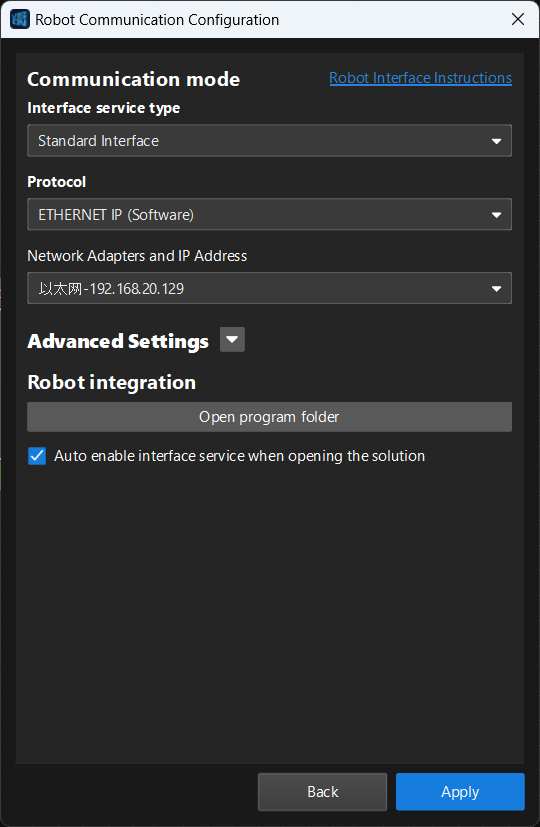
-
-
On the main interface of Mech-Vision, make sure that the Robot Communication Configuration switch on the toolbar is flipped and has turned blue.

If you use a PCI-e card to set up the EtherNet/IP communication, click this line to view the detailed operations.
Check PCI-e Card and Driver Software
-
Please make sure that the INpact EIP Slave PCIe interface card has been pressed into the PCI-e slot of the IPC, as shown below.
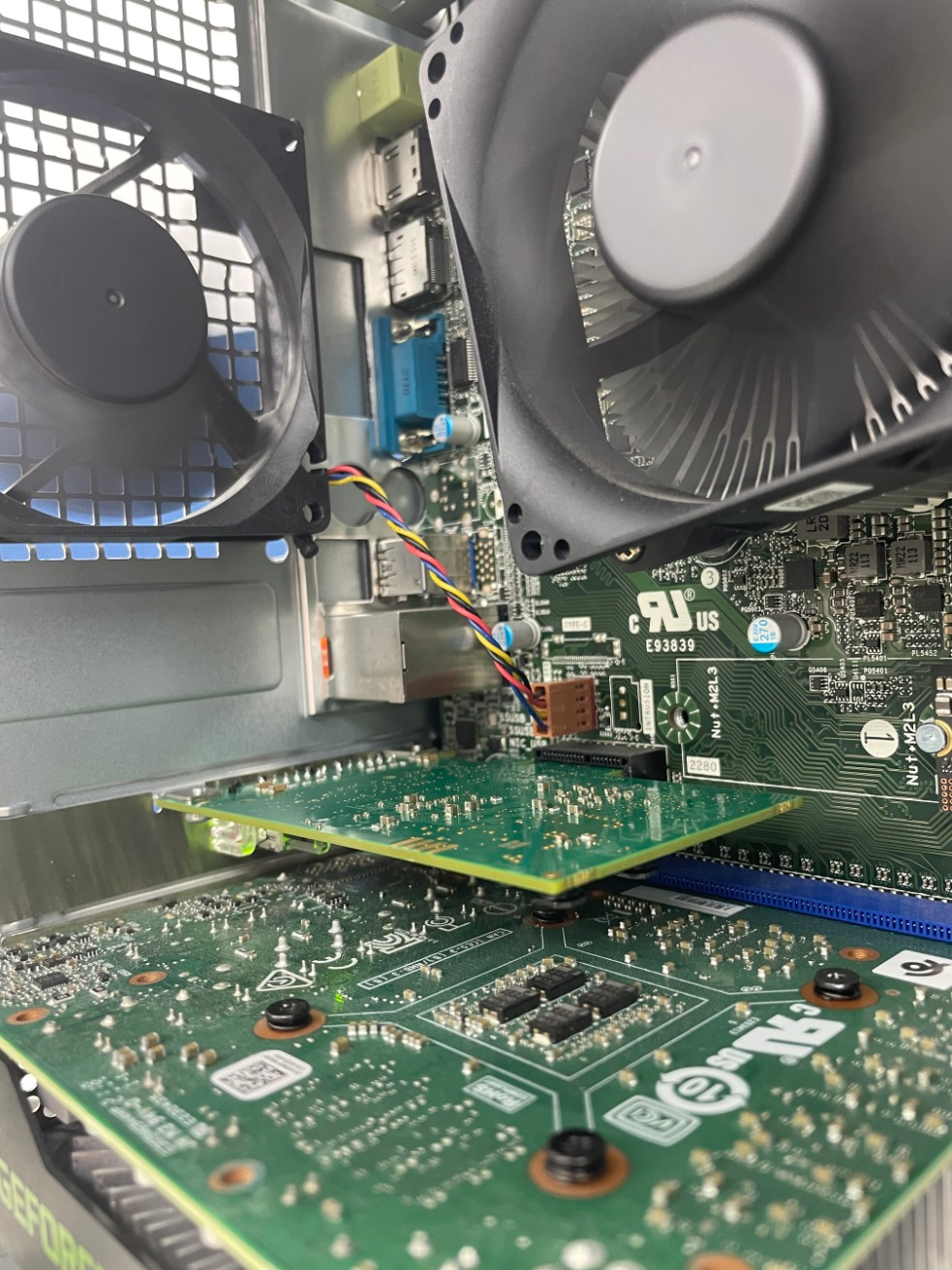
-
Start the IPC, go to Start ‣ Device Manager and check if the driver software VCI4 INpact PCIe has been installed.
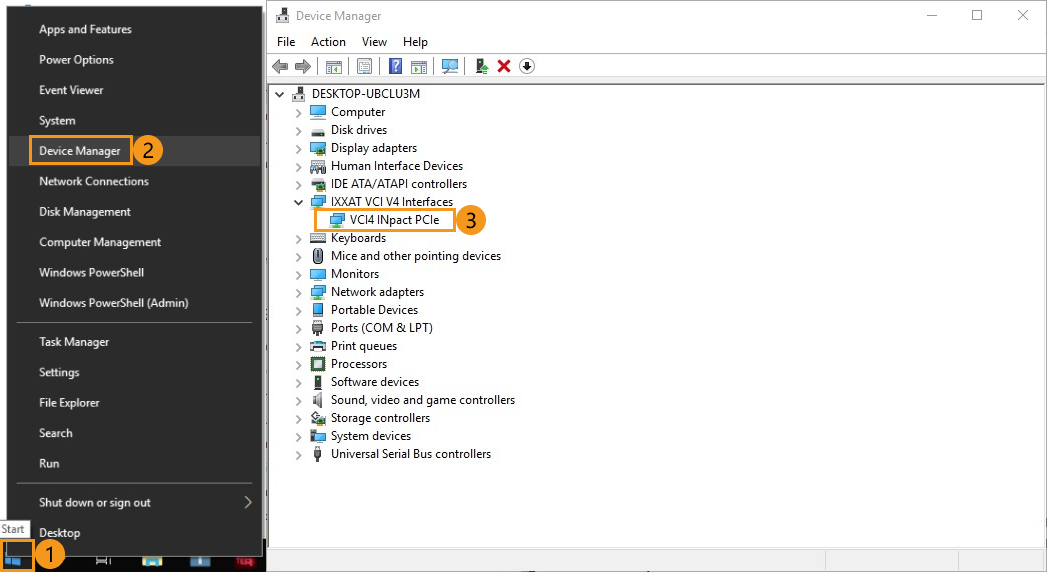
Set up Robot Communication Configuration
-
Open Mech-Vision, and you may enter different interfaces. Create a new solution according to the instructions below.
-
If you have entered the Welcome interface, click New blank solution.

-
If you have entered the main interface, click on the menu bar.

-
-
Click Robot Communication Configuration on the toolbar of Mech-Vision.
-
In the Robot Communication Configuration window, complete the following configurations.
-
Click the Select robot dropdown, and choose either Listed robot or Custom robot according to the robot used in your project. Then click Next.
-
Listed robot: Suitable for most robots. Click Select robot model to choose the specific robot model.
-
Custom robot: Suitable for gantry robots or robots not included in the listed robot category. Robot Euler angle convention and robot coordinate system need to be selected.
-
-
In the Communication mode area, select Standard Interface for Interface service type and select ETHERNET IP for Protocol.
-
(Optional) Select Auto enable interface service when opening the solution.
-
Click Apply.
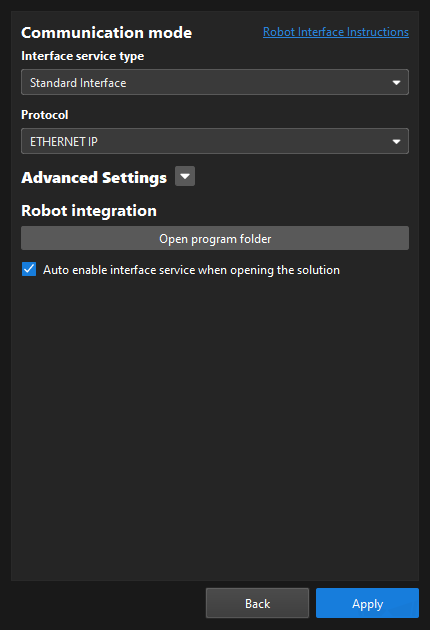
-
-
On the main interface of Mech-Vision, make sure that the Robot Communication Configuration switch on the toolbar is flipped and turned to blue.

Configure IP address of the PCI-e Card
| Ensure the interface service has been enabled before proceeding with the following operations. |
-
Download and install HMS IPconfig software on the IPC first. Use an Ethernet cable to connect the network ports of the IPC and the INpact EIP Slave PCIe.
After configuring the IP and initiating communication successfully, the Ethernet cable used here can be removed. -
Open HMS IPconfig, click to scan and select Ixxat INpact EtherNet/IP(TM). Then uncheck Retrieve IP settings dynamically from a DHCP server and enter the IP address and subnet mask, as shown below. The IP address should be the same as what is configured in the PLC. After configuration, click Apply.
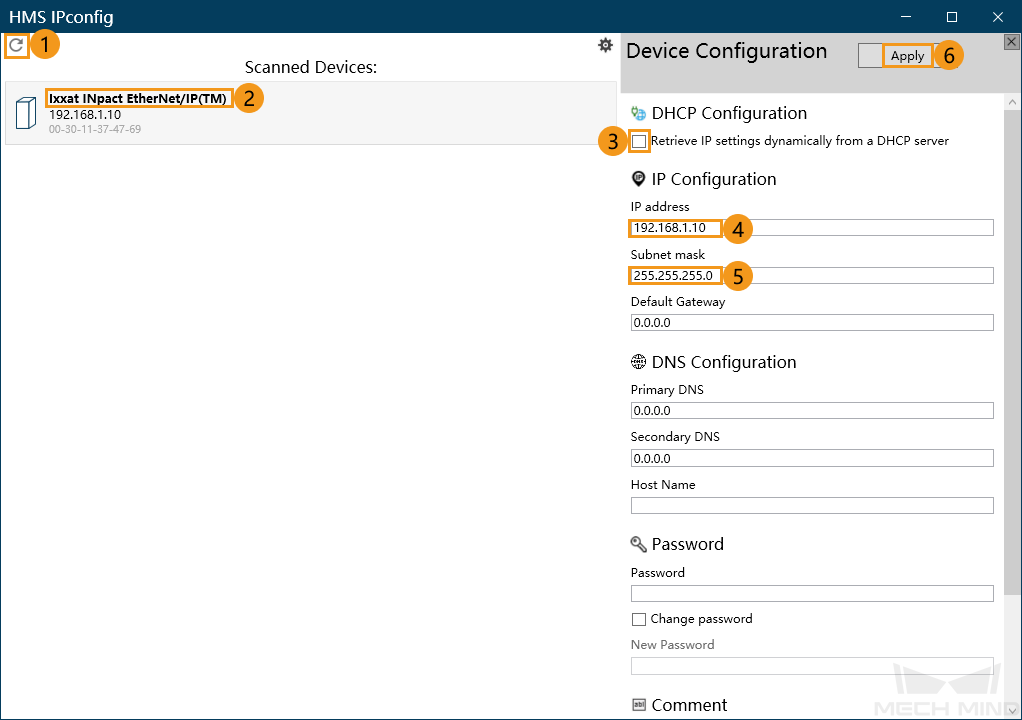
Create and Configure the PLC Project
Create PLC Project
-
Open KV STUDIO, click new, select the PLC model according to the model in use, and name the project. Then click Refer to select a location to store the project, and click OK to save settings.
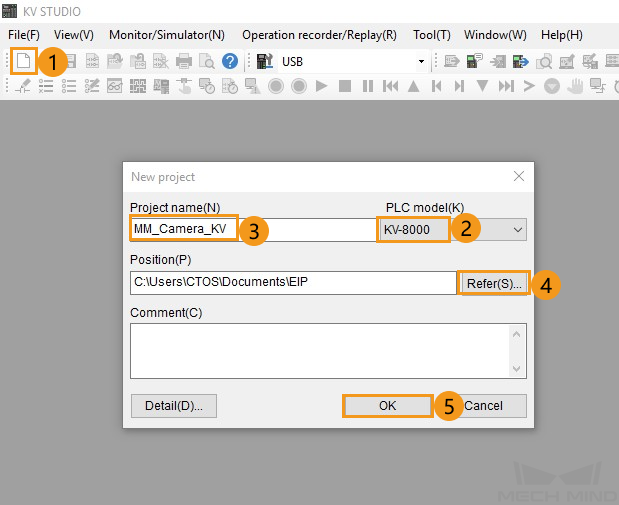
-
If the message “Automatically set the operation recorder setting?” pops up, select Yes.

-
If the message “Setup unit setting info now?” pops up, select No.
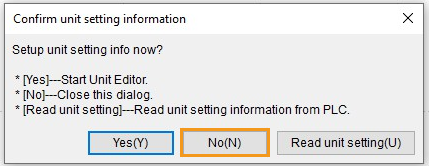
-
In the left-side Project panel, go to Unit configuration ‣ KV 8000, double-click EtherNet/IP R30000 DM10000. An EtherNet/IP settings window will appear as shown below. Select Manual in the pop-up window.
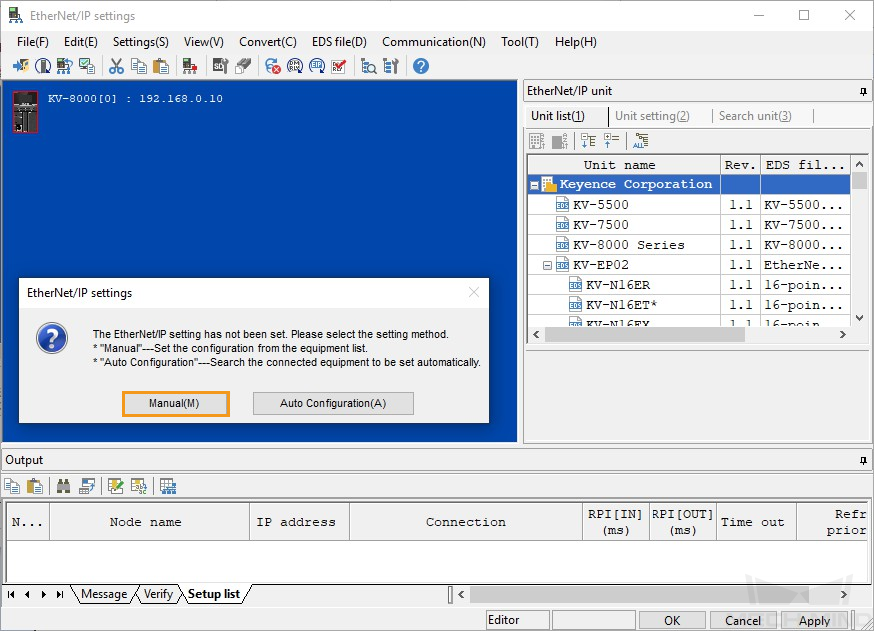
-
In the EtherNet/IP settings window, select KV-8000, click Unit setting and then set the IP address of the PLC.
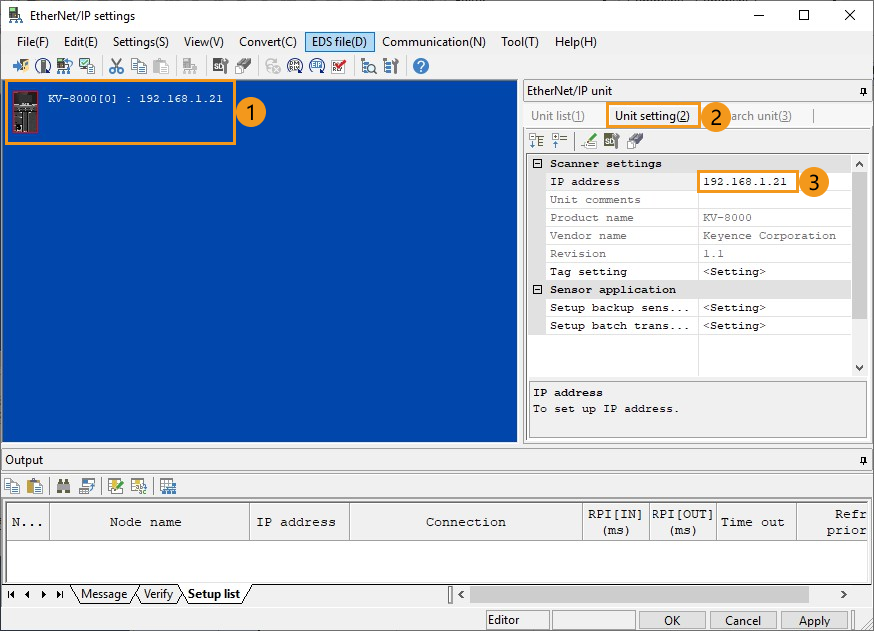
Install EDS File and Configure Communication
If you configure the software to set up the EtherNet/IP communication, click this line to view the detailed operations.
-
Click EDS file in the EtherNet/IP settings window, and select Reg. In the window that appears, select the Software EIP.eds file and click Open.
-
The EDS file is stored in the IPC. The EDS file can be found in the
Communication Component/Robot_Interface/EthernetIP/EDSpath in the directory where Mech-Vision and Mech-Viz are installed. If KV STUDIO is not installed on the same IPC, you can copy and paste theEDSfolder to the PC with KV STUDIO installed and click Reg.
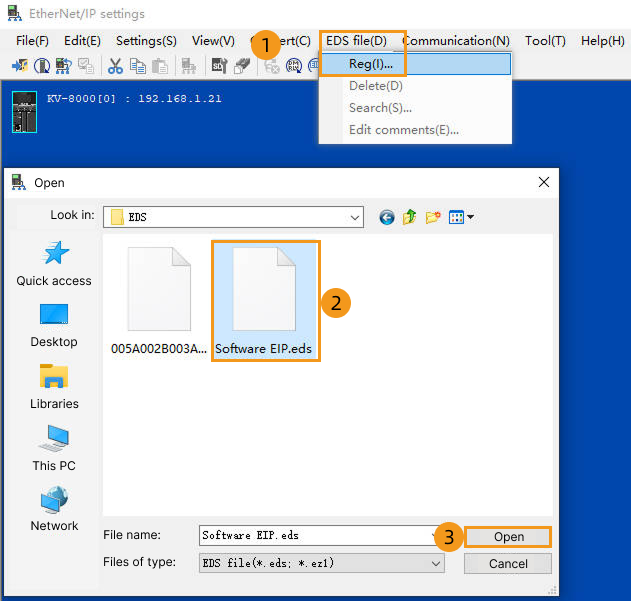
If the message “The icon specified for EDS file could not be found.” pops up, select Select icon file and then click OK.
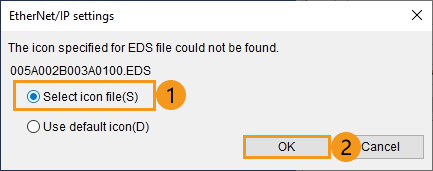
In the pop-up window, select the corresponding icon file and click Open.
The icon file is located in the same folder as the EDS file mentioned above.
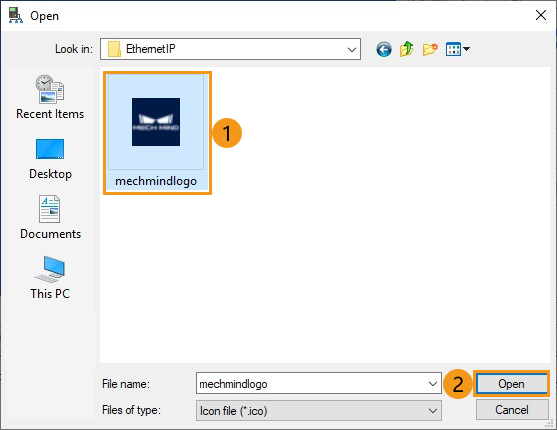
-
-
After the EDS file is registered successfully, expand Mech-Mind Robotics Technologies Ltd. and double-click the Mech-Mind Standard Interface device to connect to the EtherNet/IP network.

-
Set the IP address in the Initial adapter settings window and click OK.
The IP address here must be consistent with the IP address selected under Network Adapters and IP Address in the robot communication configuration settings in Mech-Vision.
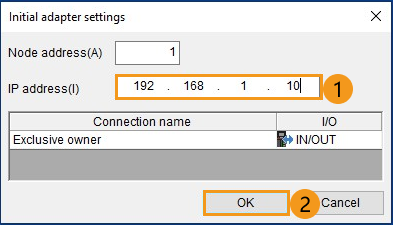
-
Select Mech-Mind Standard Interface, click Unit setting(2) and then click ... next to Connection settings.

-
Now you can see a Connection settings window. Click Assign device. Assign the IN and OUT manually, as shown below (The Input and Output in the figure are applicable to this example only.) Then go back to the EtherNet/IP settings window after assigning.
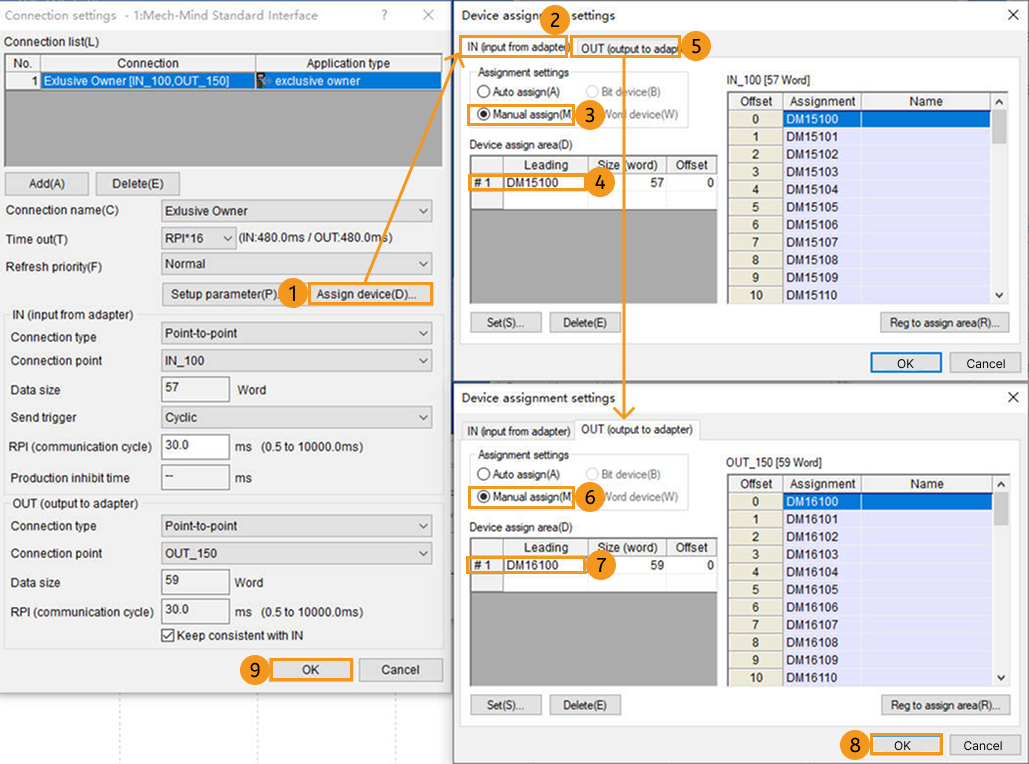
-
Now the information of the server appears in the EtherNet/IP settings window. Click OK.
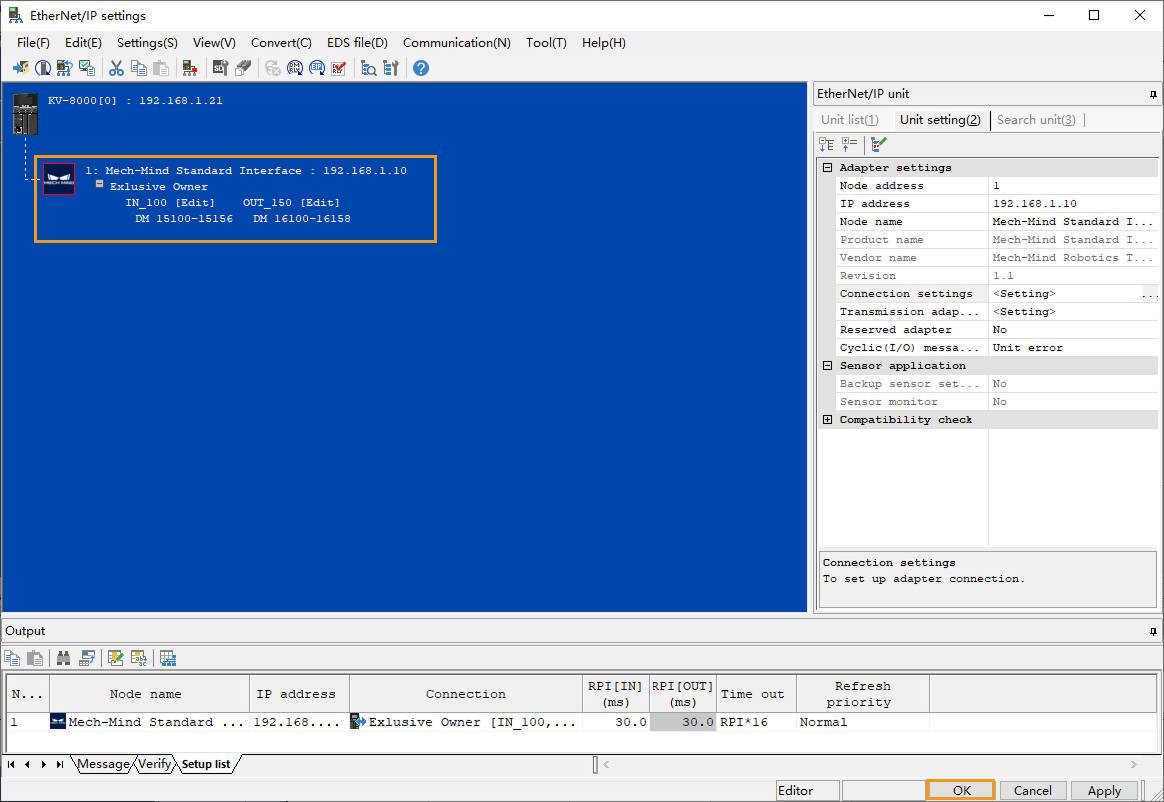
-
Click OK in the Unit Editor window.
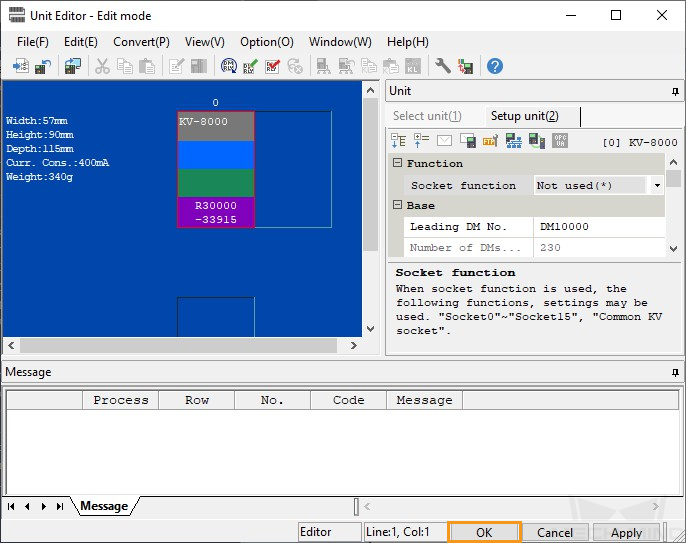
If you use a PCI-e card to set up the EtherNet/IP communication, click this line to view the detailed operations.
-
Click EDS file in the EtherNet/IP settings window, and select Reg. In the pop-up window, locate and select the 005A002B003A0100.EDS file, then click Open.
-
The EDS file is stored in the IPC. The EDS file can be found in the
Communication Component/Robot_Interface/EthernetIP/EDSpath in the directory where Mech-Vision and Mech-Viz are installed. If KV STUDIO is not installed on the same IPC, you can copy and paste theEDSfolder to the PC with KV STUDIO installed and click Reg.


If the message “The icon specified for EDS file could not be found.” pops up, select Select icon file and then click OK.

In the pop-up window, select the corresponding icon file and click Open.
The icon file is located in the same folder as the EDS file mentioned above.

-
-
After the EDS file is registered successfully, expand HMS Industrial Networks AB and double-click the Ixxat INpact EtherNet/IP(TM) device to connect to the EtherNet/IP network.

-
Set the IP address in the Initial adapter settings window and click OK.
The IP address here must be consistent with the IP address set in HMS IPconfig.

-
Select Ixxat INpact EtherNet/IP(TM), click on Unit setting(2), and then click on … next to Connection settings.
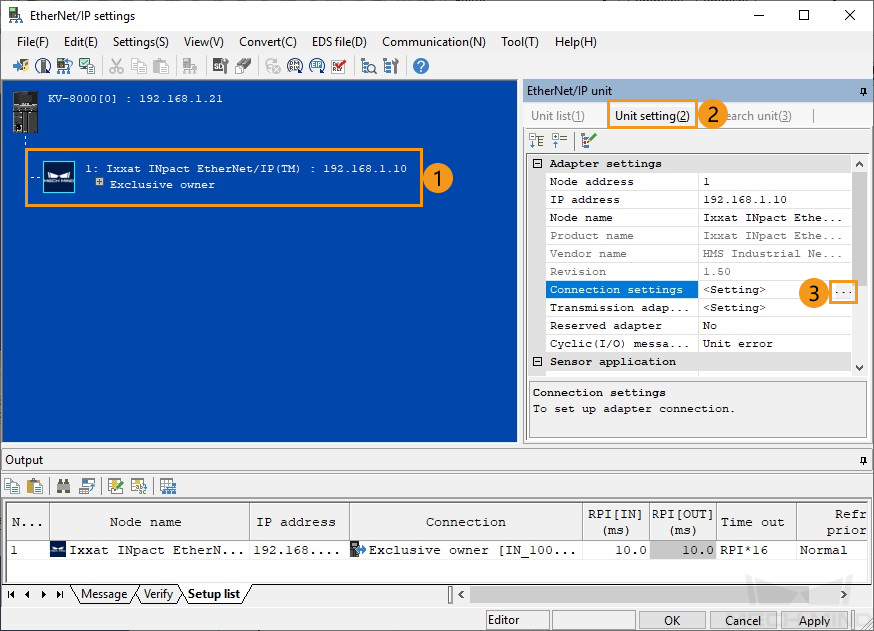
-
Now you can see a Connection settings window. Click Assign device. Assign the IN and OUT manually, as shown below (The Input and Output in the figure are applicable to this example only.) Then go back to the EtherNet/IP settings window after assigning.
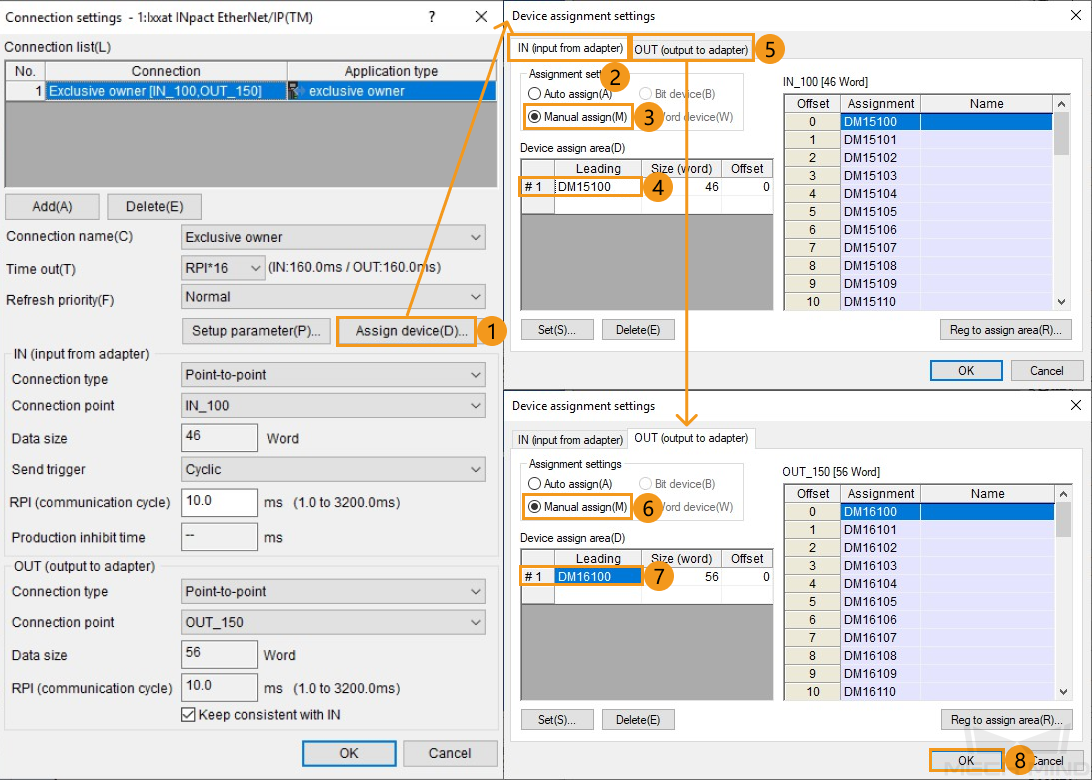
-
Now the information of the server appears in the EtherNet/IP settings window. Click OK.
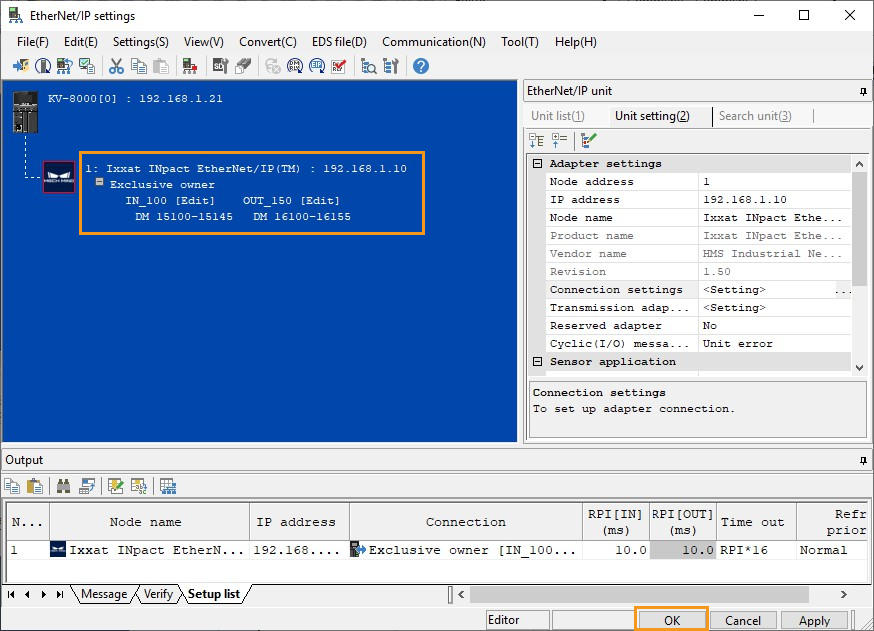
-
Click OK in the Unit Editor window.

Download Hardware Configuration to PLC
-
Go back to the main interface of KV STUDIO, click Transfer to PLC button in the menu bar, and the Transfer program window will pop up.

-
Keep the default settings, and click Execute in the Transfer program window.
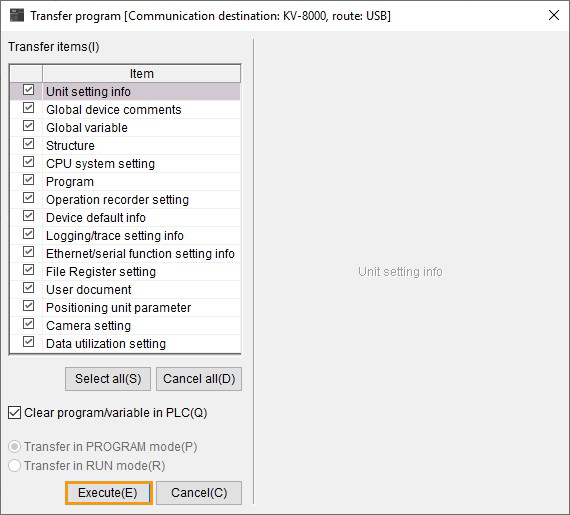
-
Select Yes in the pop-up window showing the message “Change to PROGRAM mode and overwrite?”. Select Yes in the pop-up window showing the message “Change to RUN mode?”.
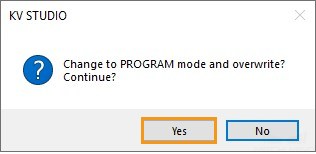
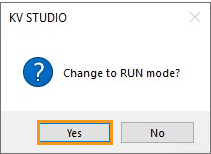
Check Communication
If you configure the software to set up the EtherNet/IP communication, click this line to view the detailed operations.
-
If the PLC is connected successfully, the status of Mech-Mind device will be displayed as online in Monitor mode.
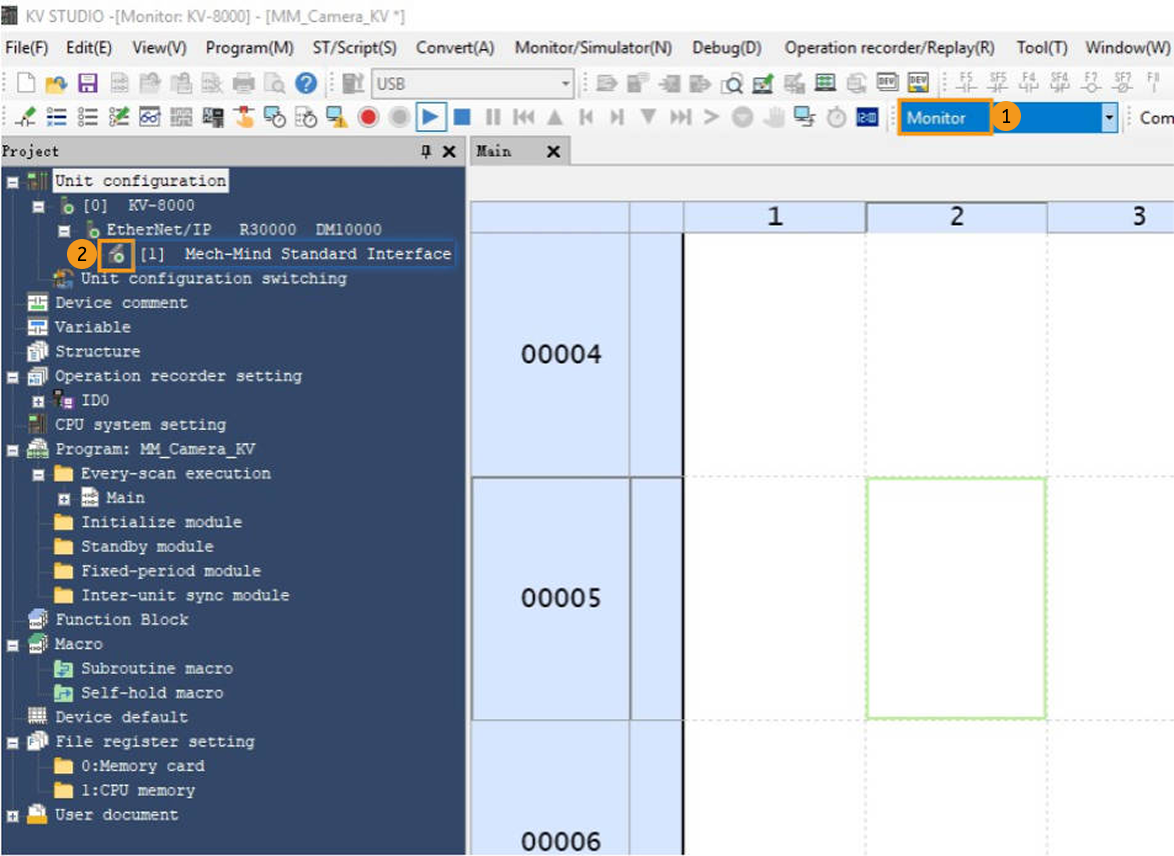
-
The PLC is successfully connected if the following message is displayed in the Console tab of Mech-Vision Log panel: Connect to ETHERNET IP controller successfully.
If you don’t see this log message, please check:
-
If the hardware is properly connected;
-
If the Interface Service has been enabled successfully in Mech-Vision;
-
If the hardware configuration has been downloaded to the PLC.
-
If you use a PCI-e card to set up the EtherNet/IP communication, click this line to view the detailed operations.
-
If the PLC is connected successfully, the status of Mech-Mind device will be displayed as online in Monitor mode.
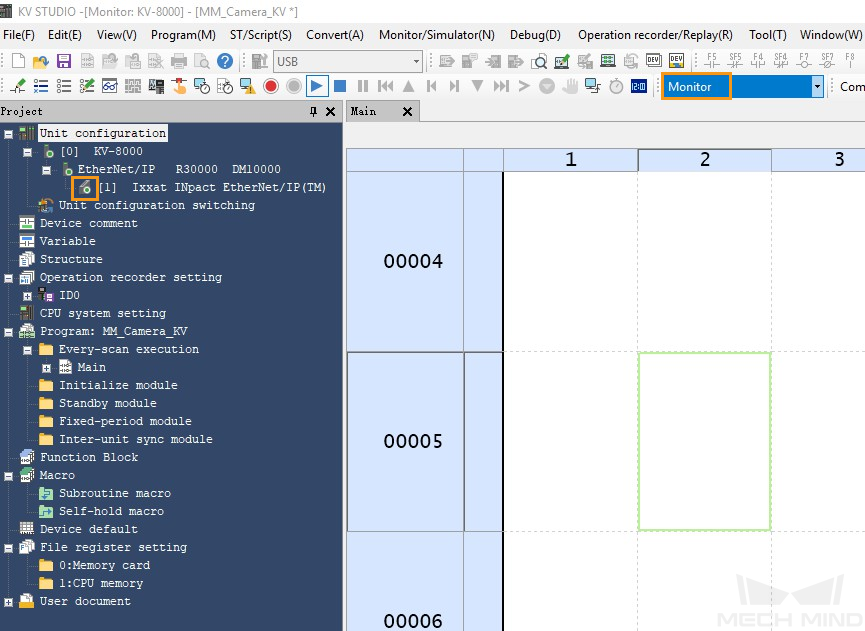
-
The PLC is successfully connected if the following message is displayed in the Console tab of Mech-Vision Log panel: Connect to ETHERNET IP controller successfully.
If you don’t see this log message, please check:
-
If the hardware is properly connected;
-
If the Interface Service has been enabled successfully in Mech-Vision;
-
If the hardware configuration has been downloaded to the PLC.
-
Import Example Program and Download to PLC
| Before you add the example program to a project already in use, it is recommended to import it to a new project and test it first. In the following steps, the project created earlier is used to import and test the example program. |
Import Mech-Mind Example Programs
-
In the main interface of KV STUDIO, go to , and the Import program window will pop up.
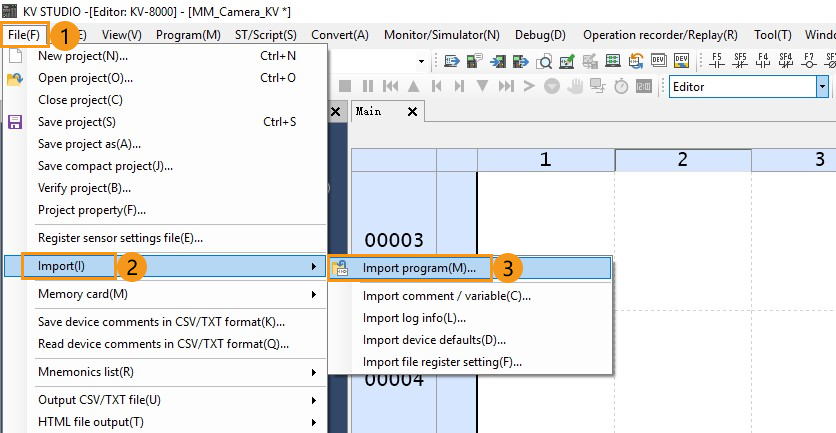
-
In the Import program window, select the CameraSignalsMove.mod, CameraTest.mod, and MM_XXX_XXX.kfb files, and then click Open.
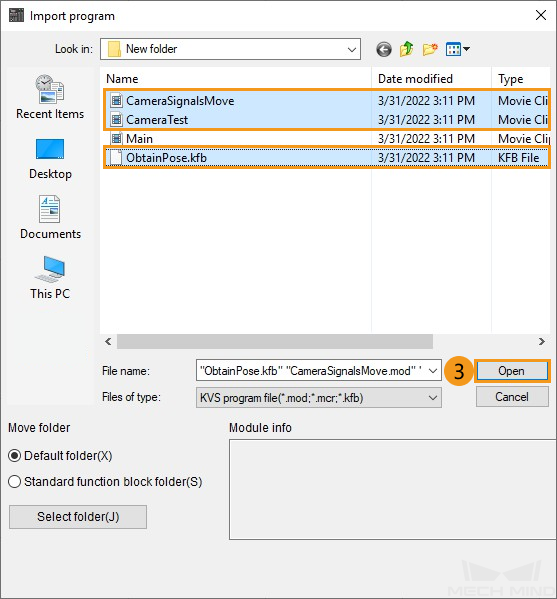
-
Click OK in the Import completed window.
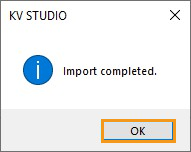
Download PLC Program to PLC
-
Go back to the main interface of KV STUDIO, click Transfer to PLC → Monitor mode in the menu bar, and the Transfer program window will pop up.
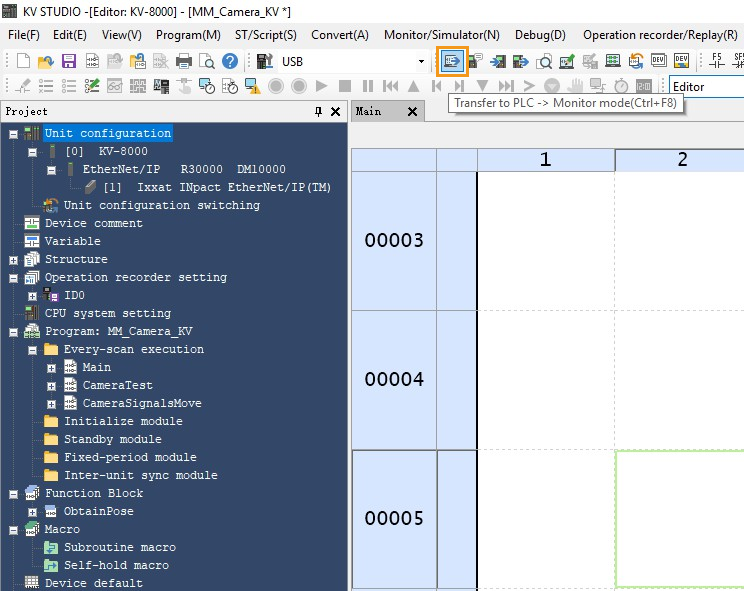
-
Keep the default settings, and click Execute in the Transfer program window.
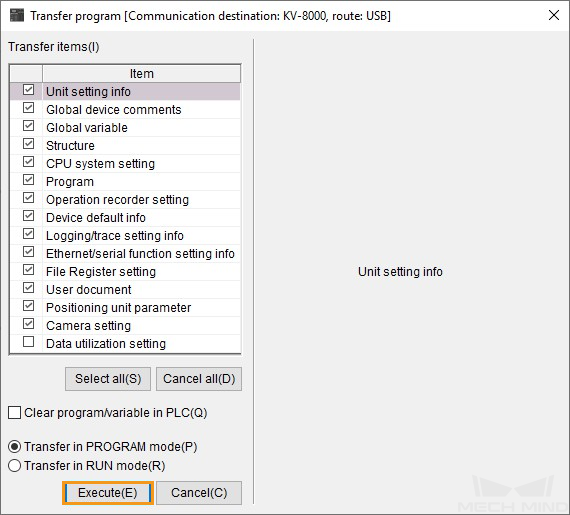
-
Select Yes in the pop-up window showing the message “Change to PROGRAM mode and overwrite?”. Select Yes in the pop-up window showing the message “Change to RUN mode?”.
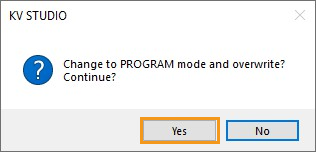
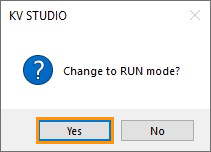
Test with Mech-Vision/Mech-Viz Project
This section introduces how to use the example program FB to trigger the Mech-Vision project to obtain vision points and trigger the Mech-Viz project to obtain the planned path. For detailed information on the I/O units, please refer to EtherNet/IP-Keyence PLC Commands.
Prerequisites
-
Return to Mech-Vision and create a Mech-Vision project. Right-click the solution and select Autoload Solution. Projects in the solution are also autoloaded. Meanwhile, the project number will show up before each project name.
-
Create Mech-Viz project. In Mech-Viz, right-click the project name in the Resources panel and select Autoload Project.
The Mech-Viz project used for testing contains a “Branch by Msg” Step that has been renamed to 1 as shown below.
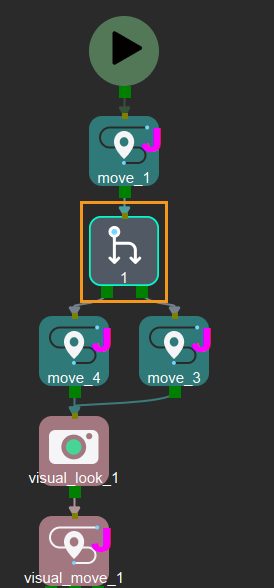
Run Mech-Vision Project and Obtain Vision Points
Parameter Settings
-
Go back to the main interface of KV STUDIO, go to Project ‣ Program, double-click CameraTest, and set the status of ToCamera.COM_ENABLE to be Always ON.

-
Set the Mech-Vision project ID according to the displayed number in the Project List panel in Mech-Vision. Set the value of VISION_PROJ_NUM to 1, then project No.1 in Mech-Vision will be started.
-
Set the number of vision points to be sent by Mech-Vision project. Set the value of REQ_POSE_NUM to 0, which means the Mech-Vision project will send all the vision points.

Start Mech-Vision Project
-
Double-click the input variable Start_Vision of the MM_Start_Vis FB, and set the value to 1 to start Mech-Vision project. Then double-click the variable again to reset the value to 0.
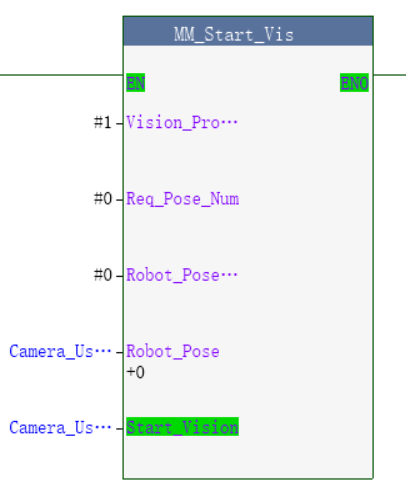
-
Click Registration monitor window, locate FromCamera.STATUS_CODE in the Device column, and then check its current value. 1102 represents that the project was started successfully. Otherwise, the corresponding error code will be returned. Please refer to Status Codes and Troubleshooting for troubleshooting.
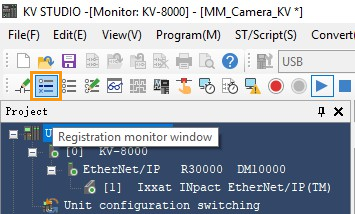

Obtain Vision Points from Mech-Vision
-
After the status code 1102 is returned, double-click the input variable Get_VisData of the FB MM_Get_VisData to set the value to 1 and therefore obtain the vision points. Then double-click the variable again to reset the value to 0. The result is shown below. The value of SendPoseNum is 3, which means 3 vision points are obtained.

-
Check the current value of FromCamera.STATUS_CODE in the Registration monitor window. 1100 represents that the vision points were obtained successfully from Mech-Vision. Otherwise, the corresponding error code will be returned. Please refer to Status Codes and Troubleshooting for troubleshooting.

Obtain Planned Path from Mech-Viz
Parameter Settings
-
Double-click the input variable Start_Empty of the FB MM_Get_VisData to set the value to 1. Then double-click the variable again to reset the value to 0. Open the device value batch modify/read window, and go to to check if the previously obtained vision data has been cleared successfully.
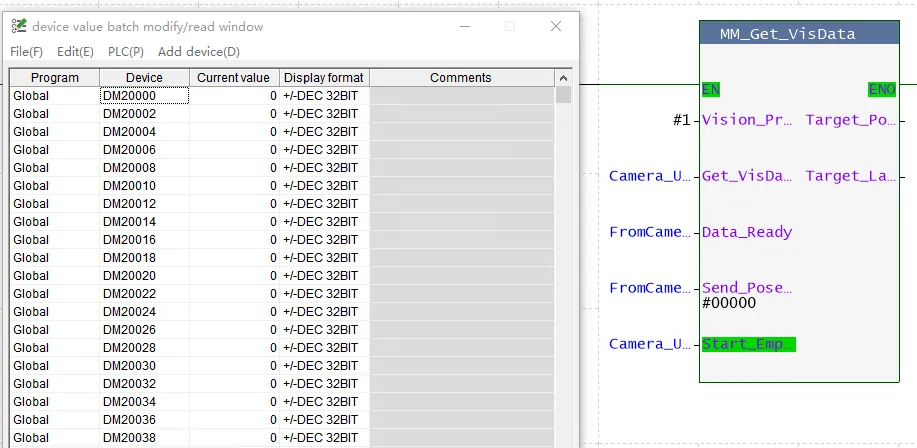
-
Set the value of Branch_Name and Branch_Exit_Port to 1 respectively, the Mech-Viz project will proceed along exit port 1 of Step 1.
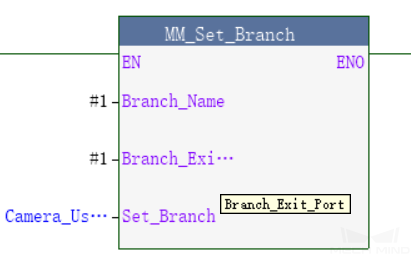
-
Set the value of Request_Pose_Type to 1. This asks Mech-Viz to send joint positions (instead of TCP data).
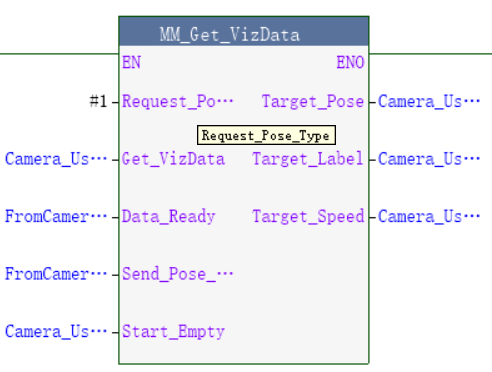
Start Mech-Viz Project
-
Double-click the input variable Start_Viz of the FB MM_Start_Viz to set the value to 1 and therefore start Mech-Viz project. Then double-click the variable again to reset it to 0.

-
Check the current value of FromCamera.STATUS_CODE in the Registration monitor window. 2103 represents that the project was started successfully. Otherwise, the corresponding error code will be returned. Please refer to Status Codes and Troubleshooting for troubleshooting.

Set Mech-Viz Branch Exit Port
-
Double click the input variable Set_Branch of the FB MM_Set_Branch, set the value to 1 in the Set New Value window to select branch in the Mech-Viz project and then reset it to 0.

-
Check the value returned by the variable FromCamera.STATUS_CODE. 2105 represents that the branch was selected successfully. Otherwise, the corresponding error code will be returned. Please refer to Status Codes and Troubleshooting for troubleshooting.

Obtain Planned Path from Mech-Viz
-
Double click the input variable Get_VizData of the FB MM_Get_VizData, set the value to 1 in the Set New Value window to obtain planned path from Mech-Viz project and then reset it to 0.

-
Check the value returned by the variable FromCamera.STATUS_CODE. 2100 represents that planned path was obtained successfully. Otherwise, the corresponding error code will be returned. Please refer to Status Codes and Troubleshooting for troubleshooting. The result is shown in the figure. The value of SendPoseNum is 10, which means that 10 robot poses in joint positions have been obtained. The joint positions are stored in TargetPose.

